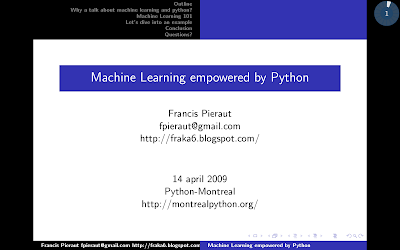Montréal StartupCamp 6 was quite interesting. As raised during the unconf discussion, French language technology entrepreneurs seems to prefer bootstrapping their companies then looking for VC foundings (ex: FeelingSoftware/Carré Technologies/DokDok/Vizmatic/QMining/Aptats/Nexyka
etc.). keynote Dave McClure presentation on how to create good pitch to investors was very good:
- Start with problem not solutions
- Look for high reaction signal (good and bad)
- Stop adding features
- Focus on customer reactions, real-time as possible
- Volume->Cost->Conversion | acquisition/activation/retention/referral/revenu...
- etc.
VCs are basically non-risk taker and followers as sheep and should be treated accordingly. But what's the point of getting VC founding for software startups? They don't need much more then computers & time. With VC founding you could get 6-12 months where most of it will be re-reimbursed with R&D tax credits. Basically, they give you cash advance for an important share of your company for a ridicule risk. VC mains arguments are:
- It will allow you to be the first in the market, its bullshit, everyone knows it is the timing that is the most important.
- 10% of 15 millions is better then 100% of 1 millions...but you still will do most of the work with more stress from investors and you might get 10% of 2 millions. Most entrepreneurs start their company to take control and not getting back to a slavery mode.
Yes it could allow you to build your product faster to meet a customer needs but better, they could make clients connections which has real value. I think that
Steve Dekorte point out exaclty what I profoundly dislike about VCs and haven't presented clearly in a
previous post, VC like professional CEO are short term peoples as oppose to founders. With a difference cost function, you will automatically get clashes which lead to frustrations, politics....basically inefficiency due to uncommon vision.
Andy Nulman Keynote presentation was interesting in the perspective of importance of a partner and the need to adapt but the mercantile conclusion was a pathetic anglo-saxon point of view: you could make more cash by doing the chicken dance then doing something interesting.
Phil Telio announcement about the new startup dedicate house
notman was great for Montréal. I will definitely apply many of the stuff learned there. As an example, if you are a founder and will move to the CEO position, you better start delegating what you are better at because it will allow you to improve others skills and will make other supervision very efficient.
 Here is a example in 6 simple steps:
Here is a example in 6 simple steps: